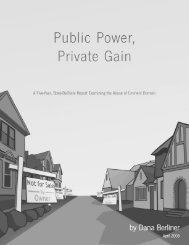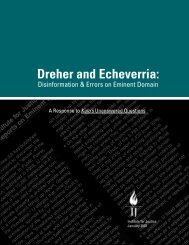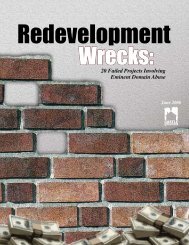50 State Report Card - The Castle Coalition
50 State Report Card - The Castle Coalition
50 State Report Card - The Castle Coalition
- No tags were found...
Create successful ePaper yourself
Turn your PDF publications into a flip-book with our unique Google optimized e-Paper software.
<strong>50</strong>statereport card<strong>Castle</strong> <strong>Coalition</strong>LEGISLATION REPORT CARD<strong>State</strong>:Nebraska• Primary purpose language means condemnations for onomicdevelopment will not be meaningfully rtried.• Agricultural property cannot be dignated “blighted.”Inc.In 2006, the Nebraska UnicameralLegislature took only a baby step towardproviding its citizens with much-neededprotection for their property rights. LegislativeBill 924 prohibits the use of eminent domain“if the taking is primarily for an economicdevelopment purpose.” However, there isnothing stopping the condemnor from declaringone primary purpose for the taking and thenchanging the purpose after condemnation. <strong>The</strong>prohibitions do not apply, however, to “publicprojects or private projects that make all or amajor portion of the property available for useby the general public … .” <strong>The</strong> bill clarifies thatagricultural property cannot be designated as“blighted” by local governments and thereforecannot be subject to condemnation.<strong>The</strong> effect of some aspects of this bill,such as the ability to use eminent domainfor “private projects that make all or a majorportion of the property available for use by thegeneral public,” is uncertain. While the Unicammay have merely intended for this provisionto allow condemnations for private museumsor recreational centers—neither of which aretraditional public uses—it also could be (andalmost undoubtedly will be) argued that thisexception will allow shopping malls or similarcommercial ventures that allow a high degreeof public access. If a court finds that this wasLegislative Bill 924Sponsored by: <strong>State</strong> Senator Deb FischerStatus: Signed into law on April 13, 2006.the legislative intent, the language restrictingcondemnations for economic developmentbecomes worthless. <strong>The</strong> Unicam would havebeen better served to limit the use of eminentdomain strictly to traditional public uses.Another deficiency of Nebraska’s newlaw is that it retains a huge exception for thecondemnation of properties designated as“blighted” under the state’s urban renewallaws, which may then be transferred to privatedevelopers. As is the case with many otherstates, Nebraska’s definition of “blight” isincredibly broad, allowing local governmentsthe opportunity to affix the label to almostany neighborhood that a private developermight desire, regardless of the condition ofthe targeted buildings. Unless the Unicamacts to clarify that blight designations shouldonly be meted out on a parcel-by-parcel basiswhere the properties are identified as posing athreat to the health or safety of the community,these loopholes will continue to allow localgovernments to condemn homes, businesses,and places of worship for private profit. In thefuture, Nebraska’s lawmakers should extendthe same protection they gave to farmers toevery property owner across the state. AllNebraskans—regardless of where they live orwhat they do—deserve protection from theabuse of eminent domain.31





